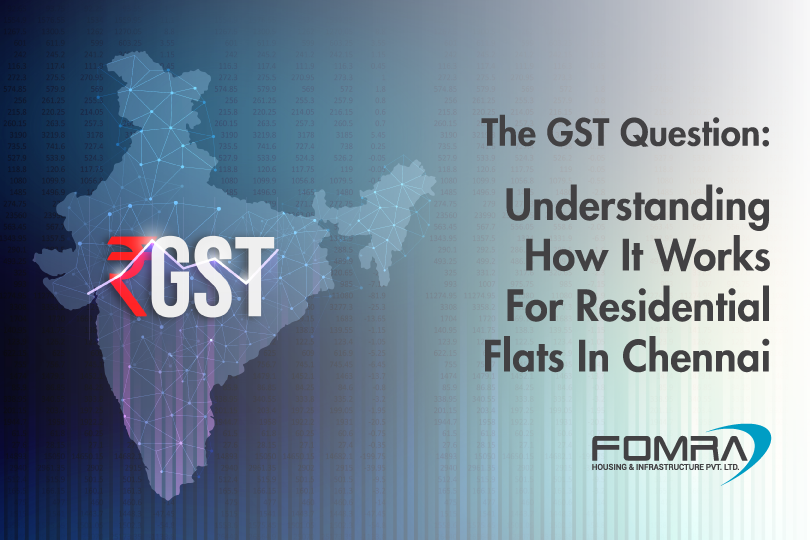Real estate is one of the fast-growing sectors of our economy.
While agriculture remains the top priority, people have shifted their investment choices to something away from the usual with modernisation. Real estate is now the most preferred area of investment. This is also because of the lifestyle, the growing advancement in other aspects that makes people dream of a better and uplifting lifestyle.
Besides, one major thing that people ever consider essential is the need to invest in a home. While many prefer living in a rented space, what inspires them more is to work to save enough money to either construct or buy a house of their dreams. While many factors affect various sectors, the real estate industry is highly influenced by the government policies and dynamic provisions that govern it.
Real Estate And How Gst Works On It
Indian real estate contributes around 9% of the total GDP of the country. The GST for residential flats was revised recently in the 33rd GST Council Meeting last year. The new rates have been proposed for the residential real estate dealings.
The revised charges stand as 5% without ITC (Input Tax Credit) on residential properties that do not fall under the bucket of affordable housing. On the other hand, GST is charged at 1% on properties that fall under affordable housing without ITC. Under-construction properties will see a 12%. Adding to this, the committee also decided that GST will not be charged on the sale of completed properties (provided the completion certificate is issued) or in case of reselling an old property. Also, the charges of the input tax credit on purchased construction materials previously charged on the builders will now be passed on to the buyers.
The New Gst Tax Policy
The new GST tax policies have given breathing space in the real estate sector, and it will be benefitting the industry in the following ways:
- Better compliance from builders due to the more straightforward tax structure.
- Fair pricing for buyers due to the reduced percentage to 1% in the affordable housing sector.
- With ITC benefits getting passed on to the buyers, their interest rate is protected.
- Better and fair pricing of housing properties.
- Reduced compliance
- Better logistics
There are two elements to GST. While one determines the material cost, the other is for the construction cost or the service cost. This also combines CGST and SGST.
However, GST does not apply to the following:
- Ready to move in flats
- Reselling of property
- Purchase/ Sale of land
The 33rd Amendment on affordable housing and the under-construction property has seen drastic changes that benefit the real estate industry. The government has put ‘home for all’ target by 2022 and owing to this target; they have brought about changes in many aspects of real estate. As mentioned previously, GST on the under-construction property is now valued at 5%, including the ITC or Input Tax Credits. Also, one will be pleased to know that there is no GST on resale properties which means you can now buy it at the construction price without paying GST.
Gst For Various Aspects
While there are so many aspects of GST, here are some of the major ones that you will have to take a look at:
Construction Services
- For construction services – For under-construction bought under a credit-linked subsidy scheme, it is 8%.
- For under-construction homes bought without subsidy, it is 12%.
- For affordable housing, it is 12%.
Housing societies and GST on their maintenance charges
Flat owners are liable to pay 18% GST on their housing property if they pay Rs 7500 as a maintenance fee to the housing society. This is also applicable to the housing societies that collect Rs 7500 per month as a maintenance fee per flat. If a person owns more than one housing property in a community, they will be charged 18% individually on each of the properties for which an amount of Rs 7500 per month. But if the price goes beyond Rs 7500, then 18% is charged on the whole amount and not the excess amount alone. If the maintenance charge is Rs 9000, then 18% is set on the entire amount Rs 9000.
Rent
Homeowners need not pay GST on the rental amount they receive from their tenants as long as it is let out only for residential purpose. However, if space is rented out for business purposes, then 18% GST will be charged on such rent.
Home Loans
While there are no such charges on the home loans take, the bank does offer various services on which the GST charges are applicable.
Affordable Housing | Luxury Housing
As per the government norms, any residential property that costs up to 45 lakhs is considered affordable housing provided it measures up to 60 sq mts in terms of carpet area. Also provided the house is in a metropolitan city. GST for such properties is charged on various aspects like
- Cost per sq ft of the property
- GST rate on a flat purchase
- ITC benefit
Here, the charges are that for flat purchase it is 1% and ITC is not applicable. On the other hand, for luxury properties, the rate of flat purchase is 5%.
While there are many aspects of GST, the new GST updates promise in giving a better real estate experience for many – not just the sellers but also the buyers.

